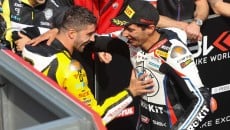We will have to wait a few more days to know the ruling by the FIM Court of Appeal on the Ducati case, but perhaps the final verdict will not be the most important point of this trial, which has shaken the MotoGP. It's difficult to affirm that the victory won by Dovizioso in Qatar is at risk, since, ultimately, it's not what Aprilia, KTM, Honda, and Suzuki (the teams that filed a complaint followed by an appeal against Ducati's "spoon") wanted.
The truth is that this process does not seem to be against Ducati but against the very organization of the championship. In other words, Gigi Dall'Igna will not end up in the stocks but Danny Aldridge - the technical director of the championship and sole judge on the technical regulations of the bikes used in MotoGP - will.
Great powers carry great responsibilities but, in real life, superheroes do not exist. Instead, there are men, with all their limitations, and an organization that should help and support them.
You don't have to be an engineering graduate to understand how the complexity of a MotoGP has increased in recent years. Electronics and aerodynamics are protagonists of a very rapid evolution. Manufacturers have strengthened the departments dedicated to the two, greatly investing in both human and economic resources. However, the organization that must guarantee the legitimacy of the vehicles has remained the same.
Then there is an army of technicians whose aim is to probe every gray area of the regulation, but there is also a series of rules that are even too simplified (if not simplistic) and Danny Aldridge. You don't need fine strategists to understand who wins in this game.
The MotoGP technical director spoke during the hearing of the Court of Appeal because he was the one to approve Ducati's "spoon". His motives for his decision, however, seem not to have been so convincing.
Making Aldridge a scapegoat for all of MotoGP's evils seems too easy. The problem lies upstream. But however this hearing will end, it was able to highlight a flaw in the championship. It will not matter much to know if Ducati's appendage is legitimate or not, but it will matter to figure out how the FIM will organize itself, in order to avoid other episodes like this in the future.
FIM's new president, Jorge Viegas, called a press conference in Losail (the first in 70 years of world championships) to explain that the Federation is present and is directly involved. Meanwhile, after the decision to reject the first complaint and then to refer the matter to the Court of Appeal, no one has come forward. Neither Freddie Spencer - who also heads FIM's Stewards Committee, which had examined the complaint - nor anyone else.
This hearing casts a dark shadow over the adequacy of the (technical) regulation and those called to enforce it. This is similar to what occurred in Sepang in 2015, when the Race Direction, chaired by Mike Webb, failed to manage the situation created between Rossi and Marquez, with all the aftermath and controversy that ensued. The Steward Panel was introduced after that.
Now what will happen? In the best case scenario, the entire internal control system should be reorganized because it is clear that the current one is not sufficient.
The FIM has the chance to turn a problem into an occasion. Instead, the risk is that they'll end up talking more about complaints and official documents than sports. And the fans will most certainly be bored by all this.









